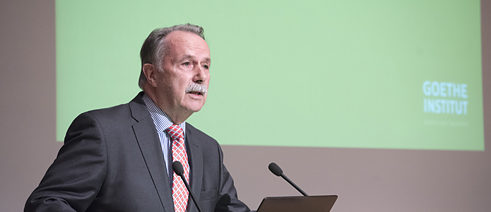Klaus-Dieter Lehmann
| Photo: Cordula Flegel
Klaus-Dieter Lehmann has been president of the Goethe-Institut for the last 10 years. In the interview, he speaks about the coalition agreement of the new government, which envisions a strengthening for foreign cultural and education policy, along with a focus on Africa. He also discusses future perspectives, such as digitization, and the role of Europe for the work of the Goethe-Institut.
Future Perspectives
The Goethe-Institut has been trying to push digitization in foreign cultural and educational policy for a long time. Now it seems that the government is finally on board. Digitization is crucial for the future - online services, such as language courses on the internet, are ideally suited for reaching a high number of people. In addition, one can use social networks to get across a message quicker and thus reach more young people: "While we are proud of our real world possibilities, they cannot be used in the same way as digital offers and products - with these, we can get to the bottom of things and reach larger numbers."
A reminder and a look forward
Another important focus of the coalition agreement is Africa. In recent years, the Goethe-Institut has carried out a number of projects in the neighboring continent, "because we are convinced, that neighborship also means partnership." In addition to educational programs, it is important to promote talents in Africa from local scenes and link them with regional communities. Digital platforms could also be used for this purpose. The Goethe-Institut is also looking at Germany's colonial history in Africa, which cannot be done by one party only, "otherwise it would be one-sided navelgazing, which must be avoid. We have sent African curators to former colonies and asked them how the colonial history has influenced culture, and with these voices we can assess everything and deal with our history together. "
